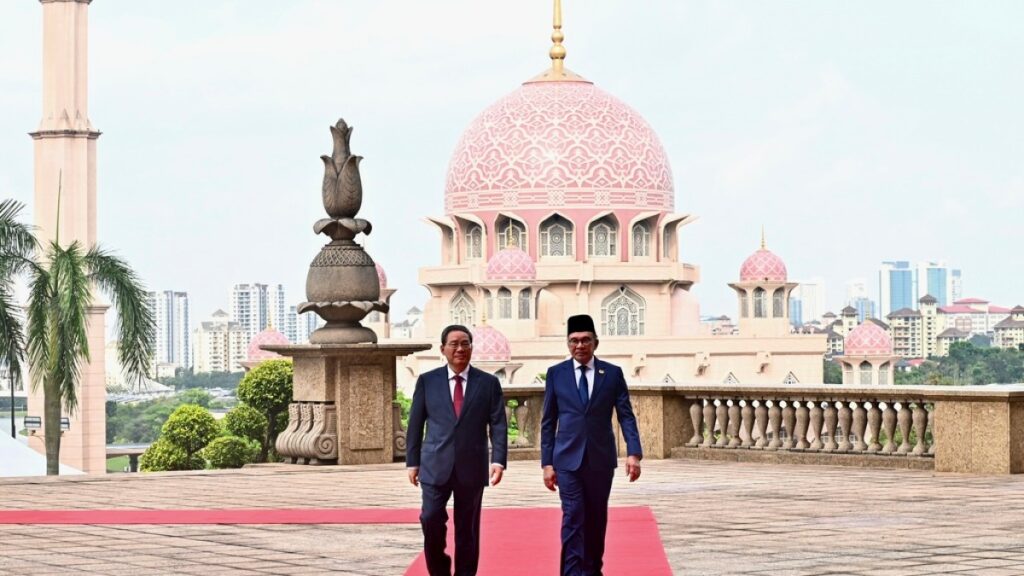Malaysia Seeks Closer Ties with BRICS Amidst Deepening Economic Collaboration with China
PUTRAJAYA, Malaysia — As Chinese Premier Li Qiang continues his influential diplomatic tour of the Asia Pacific, Malaysia has expressed a keen interest in joining the BRICS alliance—a group of developing economies currently composed of Brazil, Russia, India, China, and South Africa. This announcement precedes Premier Li’s visit to Malaysia’s administrative capital, Putrajaya, where a renewed five-year economic and trade cooperation agreement was signed between the two nations.
This milestone moment arrives as China and Malaysia celebrate their 50-year diplomatic relationship. The agreement, aimed at reinforcing bilateral ties, was finalised during Li’s visit—the concluding segment of a regional mission designed to bolster China’s presence in the Asia Pacific amidst rising geopolitical tensions with the United States.
"China is ready to work with Malaysia," declared Premier Li, received with exceptional ceremonial honors by Malaysian Prime Minister Anwar Ibrahim the previous evening. Li further emphasized China’s commitment to advancing modernisation through high-quality development, while acknowledging Malaysia’s parallel efforts in national development.
High-level discussions between Li and Anwar culminated in the signing of multiple agreements, spanning sectors such as advanced manufacturing and the digital economy. Malaysian officials highlighted these agreements as pivotal for enhancing industrial collaborations and fostering economic growth. Additional pacts were inked to encourage investments in green development, combat transnational crime, and support urban development, higher education, tourism, cultural exchanges, and scientific advancements.
Geopolitical Hints and Strategic Alliances
While the primary agenda focused on trade, Anwar’s pre-visit remarks to Chinese media hinted at deeper geopolitical undercurrents. In a notable declaration, he articulated Malaysia’s intention to join the BRICS bloc, pending feedback from the current chair, South Africa, regarding Malaysia’s expression of interest. Anwar endorsed the BRICS’s Global South agenda, critiquing what he described as a "Western narrative" regarding the Israel-Gaza conflict, particularly highlighting a skewed focus on Hamas’s October 7 attack on Israel.
The emergence of China, Anwar argued, introduces a necessary counterbalance in global politics, providing "a glimmer of hope."
During Premier Li’s three-day sojourn in Malaysia, issues like territorial claims in the South China Sea are anticipated to surface. Malaysia, along with Vietnam, Brunei, the Philippines, and Taiwan, contests Beijing’s extensive claims over this crucial maritime zone. Yet, contrasting with the more confrontational approach of the Philippines, Malaysia opts for a more diplomatic stance. This careful diplomacy is partly to safeguard significant economic relations, with China remaining Malaysia’s largest trading partner since 2009. Bilateral trade in the previous year alone amounted to 450.84 billion ringgit ($98.90bn).
Echoing the historical continuity in bilateral relations since the mid-1970s, Malaysia’s Foreign Minister Mohamad Hassan underscored the strength of these ties while addressing The Star newspaper, stating that they provide a foundation for amicably managing and resolving any arising issues.
On the visit’s agenda, Premier Li is also slated to meet Malaysia’s king, Sultan Ibrahim, and participate in the groundbreaking ceremony for the East Coast Rail Link (ECRL), a flagship project under China’s expansive Belt and Road Initiative.
Source: MalayMail
